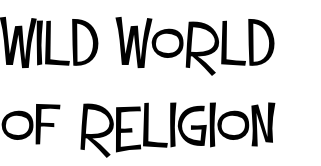

Why "One More Website" evaluating
questionable religious teachers and groups?
There are a wide variety of websites on the Internet which critically evaluate the
teachings and activities of certain religious teachers and groups. They are frequently
referred to as cult-
Click here for an explanation of the term cult.
What is different about this site? To answer that question, we need first to clarify
some varieties of cult-
Secular Cult-
To the average secular—perhaps atheist or agnostic—observer, the bickerings among
Christian teachers and groups over doctrines, methods and styles of authority may
seem silly. Not wishing to get into any debate over these "in-
Religious Cult-
Many Internet sites which specialize in profiling and documenting the teachings
and activities of various religious groups and teachers are created by those who
have a particular religious doctrinal stance they wish to defend. Their definition
of cult may be any group which deviates doctrinally from a very narrow doctrinal
"orthodoxy" to which they subscribe. And thus the doctrinal teachings of such groups
may receive a very thorough profiling on most religious cult-
Ex-
Once an individual or a group of individuals manage to extricate themselves from
involvement in a religious group which they are convinced held them in some sort
of spiritual bondage, they may feel called to warn others to avoid the group. And
they may desire to reach out to those still in the group and attempt to help them
also "see the light." In most cases, their primary focus is not so much on the error
of the doctrines of the group that they left, but the methods used by the leadership
of the group to keep them deceived. Thus the material on most ex-
Christian Apologetics Cult-
While many religious cult-
"Spiritual Abuse" Cult-
An increasing number of websites, as well as books available in Christian and
secular book stores, have brought to the attention of the public the reality that
abuse within religious groups is not limited to just physical matters. When a leader
or group’s teachings and practices harm the mental, spiritual, and emotional well-
All of the above perspectives have merit. And I have found sites from each variety very helpful. Even if one does not agree with the ultimate subjective evaluation, by the site authors, of the teachers and groups which they profile, most of them do include accurate documentation from which one can glean useful information.
So why one more site covering the same general issue of questionable religious teachers and groups? Because the specific issues which concern me regarding the potential harm of such teachers and groups are different in kind, or in detail, from all of those perspectives above. And I believe my concerns to be perhaps even more fundamental than those expressed on most of the types of sites listed above. They are even more fundamental than whether a group can be classified as a "cult" by any definition, or its leader classified as a "cult leader."
- I am concerned about any religious setting in which the freedom of the individual
to have a personal, one-
on- one relationship with Jesus Christ and God the Father is inhibited in any way. - I am concerned about any religious organization, any leaders of such religious organizations, and any teacher who in any way insert themselves or their system or their teachings between the individual believer and that believer’s immediate access to God … and to the simple truths of the scriptures.
- I am concerned about any religious teaching which subverts the basics of simple faith
in the teachings of Jesus as seen in the Sermon on the Mount, and turns faith and
salvation and the daily Christian walk into a complex, convoluted process through
twisting of scripture and through requiring or encouraging extra-
biblical and unbiblical gimmicks and standards. - I am concerned about any teacher or religious group which takes the simplicity of the truths of the Bible and distorts them to use for an illegitimate or evil purpose—whether it be to validate their own warped views such as rabid racism, to justify oppression of one group of people over another, to excuse their own sinful actions, or any other reason.
- And I am concerned about any teacher or religious group which would, subtly or openly, strip from the individual believer their right and ability to think and act for themselves under the guidance of the Holy Spirit.
Therefore the primary purpose of this site is
to share documentation regarding those groups and teachers
which I believe to exhibit
one or more of those characteristics listed above.
Unless otherwise noted, all original material on this Field Guide website
is © 2001-
Careful effort has been made to give credit as clearly as possible to any specific material quoted or ideas extensively adapted from any one resource. Corrections and clarifications regarding citations for any source material are welcome, and will be promptly added to any sections which are found to be inadequately documented as to source.